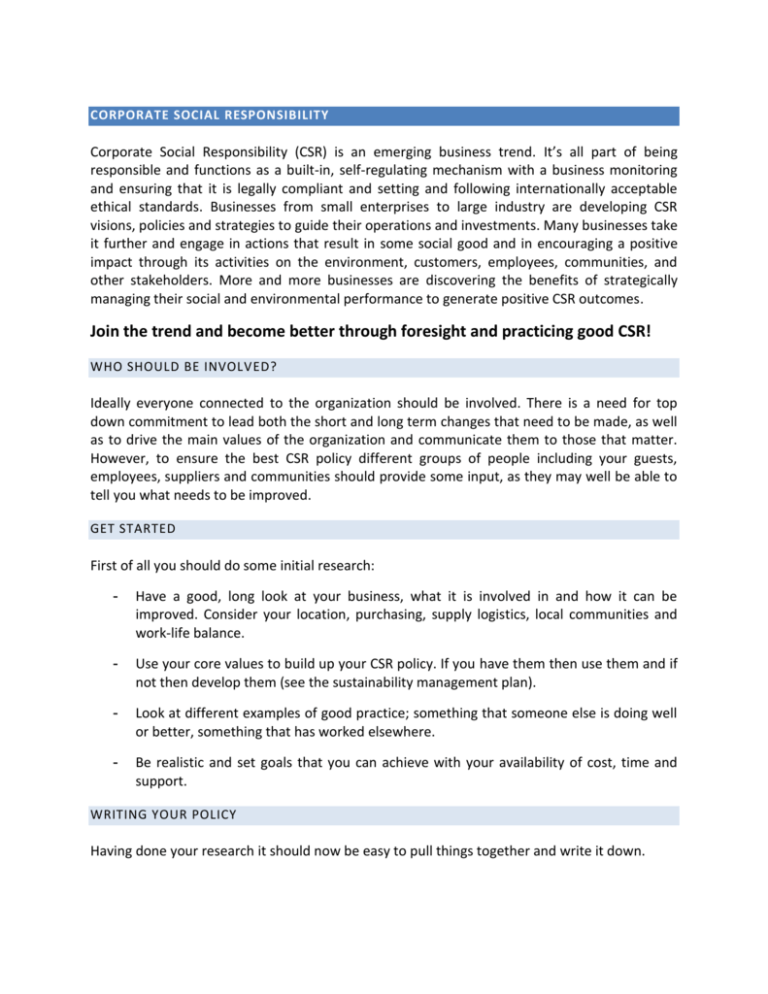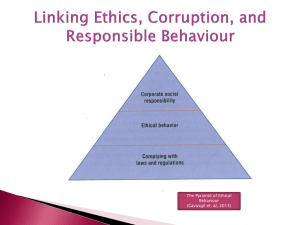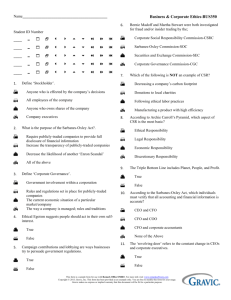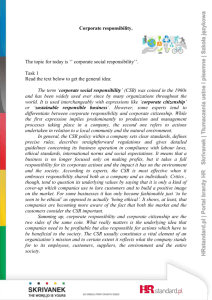Corporate-Social-Responsibility
advertisement

CORPORATE SOCIAL RESPONSIBILITY
Corporate Social Responsibility (CSR) is an emerging business trend. It’s all part of being
responsible and functions as a built-in, self-regulating mechanism with a business monitoring
and ensuring that it is legally compliant and setting and following internationally acceptable
ethical standards. Businesses from small enterprises to large industry are developing CSR
visions, policies and strategies to guide their operations and investments. Many businesses take
it further and engage in actions that result in some social good and in encouraging a positive
impact through its activities on the environment, customers, employees, communities, and
other stakeholders. More and more businesses are discovering the benefits of strategically
managing their social and environmental performance to generate positive CSR outcomes.
Join the trend and become better through foresight and practicing good CSR!
WHO SHOULD BE INVOLVED?
Ideally everyone connected to the organization should be involved. There is a need for top
down commitment to lead both the short and long term changes that need to be made, as well
as to drive the main values of the organization and communicate them to those that matter.
However, to ensure the best CSR policy different groups of people including your guests,
employees, suppliers and communities should provide some input, as they may well be able to
tell you what needs to be improved.
GET STARTED
First of all you should do some initial research:
-
Have a good, long look at your business, what it is involved in and how it can be
improved. Consider your location, purchasing, supply logistics, local communities and
work-life balance.
-
Use your core values to build up your CSR policy. If you have them then use them and if
not then develop them (see the sustainability management plan).
-
Look at different examples of good practice; something that someone else is doing well
or better, something that has worked elsewhere.
-
Be realistic and set goals that you can achieve with your availability of cost, time and
support.
WRITING YOUR POLICY
Having done your research it should now be easy to pull things together and write it down.
AIMS AND OBJECTIVES
Write down some clear, broad objectives, possibly covering some or all of the following:
-
Environmental aims: reducing waste, water and energy.
-
Social and community: contribute to and become involved with your local
community and charities and encourage others to do the same.
-
Ethical issues: ensure your workplace practices are ethical as well as your
purchasing.
-
Sustainable development: ensure a better quality of life for everyone.
-
Business relationships: make sure you follow a clear code of conduct, pay your bills
on time.
IMPLEMENTATION
Now specify what you need to do to achieve your objectives i.e. how you will reduce your
waste. This can also be linked to your sustainability and environmental management plans.
Ask your employees how they might be supported in CSR; give time off for volunteers working
in the community, match funds raised by staff for charity.
Find out how your organization is able to become involved in local organizations and to help.
RISK MANAGEMENT
Make sure you identify your risks and set up clear controls to manage them. Look out for any
potential new issues e.g. environmental concerns and this will enable you to minimize the
impact on your corporate reputation.
INTEGRATE!
As mentioned already, you will see that there are links between your CSR policy and other
existing policies such as Health and Safety, Sustainability, Human Resources etc. Ensure that
they are consistent across the board, and that there are no conflicting aims.
SHOW THAT YOUR CSR POLICY WORKS .
Finally, make sure that you measure the impact that you are having e.g. customer satisfaction,
employee measures such as improved skills and job satisfaction, reduced absenteeism and
specific targets such as reduced energy use.
Communicate your CSR policy and its success and motivate everyone!
EXAMPLE 1.
{Name of organization} is dedicated to creating business growth while ensuring that CSR is a
part of its responsibility and that our impact on the environment is minimized and that those
with whom we associate with are encouraged to do the same. We aim to play an active part in
and support the community in which we operate and champion worthy causes wherever
possible, directly or indirectly. We will ensure that ethical practices are carried out across our
organization and that we continue in our commitment to our most valuable resource, our
employees.
All staff are aware of the Policy and are supportive of it. Participation and proactive efforts and
ideas are welcomed and acknowledged.
Overall responsibility for developing corporate policies on social, ethical and environmental
matters and reviewing them lies with the Board of Directors. It is then the responsibility of
individual lodge managers to communicate and apply that policy within their particular area
taking account of legislation to ensure compliance with the policy and to maintain, review and
refine procedures accordingly.
The three key areas of corporate social responsibility at {Name of organization} are:
Environment
Community
Employment and ethics
Environment
ECRM is committed to the environment and reducing our impact on it. This can be seen in
greater depth in our Environmental Management Policy.
Community
With most of our hotels situated in areas where local communities exist, we consider the
essence of the community as an essential part of our being. Without their presence, we would
not exist, and so we strive to ensure that the only impact that we have in the area is a positive
one which benefits the local community in a transparent and sustainable way.
Our policies and codes of conduct for guests and employees reflect this, as do the various
community initiatives that we support and encourage.
Employment and ethics
{Name of organization} commits to:
Abiding by legislation relating to employment rights and equal opportunities, especially nondiscrimination on the basis of ethnic origin, religion, gender, age, marital status or disability.
Ensuring that physical, verbal and psychological abuse or sexual or other forms of harassment
towards employees are not tolerated.
Paying wages and benefits which meet or exceed national minimum requirements and adhere
to working time regulations where applicable.
Not to neither use forced labour nor employ workers under the school-leaving age.
To provide a safe and secure workplace and promote good health and safety and
environmental practices.
To give employees the freedom to associate or bargain collectively without fear of
discrimination.
To allow employees to report any concerns they may have over unethical business practices or
conduct, dangers to health and safety, or breach of company policies. Any such disclosures will
be appropriately investigated.
All employees are expected to behave ethically and with integrity and honesty.
Not to give or receive any bribes, extra contractual gratuities, inducements, facilitation fees or
similar payments.
Not to donate to any political party or similar organisation.
All achievements in CSR will be reported on an annual basis, and the report will be
communicated to all stakeholders on the website.
EXAMPLE 2.
The Board of Directors of {Name of organization} recognises the importance of corporate social
responsibility and through consultation with guests, employees and other stakeholders has
developed a corporate social responsibility policy. We are committed to communicate our
commitment to corporate social responsibility to the attention those working within our
organization as well as to a wider audience.
This policy will be reviewed and measured annually to ensure that our commitment to
environmental responsibility, the community, and our ethical policy are addressing current
issues and are as forward thinking as possible.
The CSR policy addresses four key areas:
Environmental Impact; ensuring there is a sustainability culture through the business and our
employees. We will focus on:
-
Complying with all relevant environmental legislation, regulations and approved codes
of practice
-
Protecting the environment by minimising our pollution of land, air, and water
-
Keeping waste to a minimum through the efficient use of materials and resources
-
Managing and disposing of all waste in a responsible manner
-
Providing environmental awareness training for our employees to ensure that the policy
can be followed
-
Ensuring that environmental
implementation
-
Monitoring and continuously improving our environmental performance
-
Regularly communicating the results of our environmental performance to our
employees and other significant stakeholders
factors
are
considered
during
planning
and
More detail on how we will achieve the above can be seen in the environmental management
plan.
Procurement Management; working with our suppliers to source environmentally friendly
products which where possible are locally sourced and with minimal delivery packaging.
We will endeavor to:
- Share our environmental expectations with our suppliers and contractors and
encourage them to adopt sound environmental and sustainable practices, such as
reducing the amount of packaging and consolidating deliveries.
-
work with our suppliers to increase usage of environmentally friendly products and
supplies
Commit to responsibly sourced food products and ingredients following seasonal trends
and sourcing locally whenever possible to reduce food miles and support the local
community.
Community Investment and Social Impact; making sure that we work within our community,
providing both support and positive impact. We will:
- Communicate regularly with community leaders
- Ensure that there is no negative impact from our business activities on the local
community
- Source appropriate and worthy local initiatives and schemes to support and encourage.
- Provide employment within the local community whenever possible
- Communicate and uphold our guest and employee codes of conduct with regards to
local community, culture and historical artifacts.
Employment Practices; ensuring that our organization is one of the best employers in its
industry, through fairness and equality. We will:
-
Provide a workplace in which diversity is valued and there are equal opportunities
-
Provide a mechanism by which employees can raise their views and be engaged in
change and issues that affect the company.
-
Provide a safe and secure workplace which is conducive to the health and welfare of
employees.
-
Support employees with training and opportunities for promotion to help them reach
their potential and maximise their contribution to wider company strategy.
-
Recognise and reward individuals on the basis of their own performance and that of the
company.








